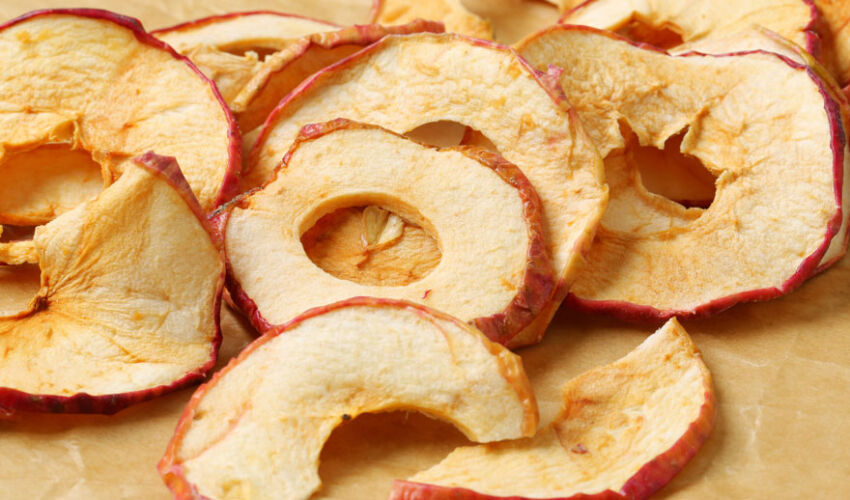
Moldovan orchardists have for years faced a variety of difficulties in selling apples on foreign markets, from embargoes to logistical problems. As a basic recipe, the government suggests uprooting old orchards and planting new ones with varieties popular in Europe, drip irrigation and anti-hail protection. This requires investments of 30-40 thousand euros per hectare. But there is no guarantee that sales will be stable and constant, for example, against the background of the presence of such a player as Poland on the European market.
Attempts to sell these fruits to other countries (India, Qatar, etc.) have not yet led to any large-scale results. To sell products only to canneries means to work at a loss. Only inveterate optimists can count on resumption of full-scale exports to Russia and other CIS countries.
One of the solutions, at least partial, could be drying apples to sell them as dried fruit or chips.
Dried apples have a very big potential. They can be used on their own or mixed with other dried fruits to make compotes. They are used in the production of granola (a type of granola) and fruit bars. Ideal as a filling for pies, muffins, klafut and other sweet treats. In addition, dried apples can come in handy for creating unusual sauces, puddings. They can be added to porridge or yogurt to give the dish a rich flavor and increase the nutritional value.
In addition, it is a product of long storage, not requiring refrigerators, and with high added value. When dried, apples lose 84% of their weight; accordingly, their transportation is much cheaper than that of a fresh product.
At Food&Drinks 2025, several manufacturers were offering dried apples in various shapes: both rings and small cubes. At retail, the rather inexpensive Aidared variety was sold for 250 lei per kilogram, although other vendors had offers for 150 lei.
A separate product is apple chips in small consumer packaging. They are not as popular as potato chips, but they are worth at least trying. They are really tasty, caramelized, and with them you can just as successfully watch movies and TV series as with popcorn. Well, and they are certainly healthier than potatoes or cucu-ruza.
According to Irina Rotar, export manager of Maestro Fruit, the company has long ago mastered the production of dried apples and chips with different flavors. These products are successfully exported to 22 EU countries and several Arab states.
Serghei Sokokol, the administrator of the Nisporeni-based company Nadea Capital, said that the company has been producing various dried fruits with and without chocolate for five years. And they are also actively trying to break through to foreign markets with them.
“We have not succeeded with apples yet, but last year we managed to send to Bulgaria for the first time six tons of prunes with bone, dried on steam. Then we found out that the buyer immediately forwarded the whole batch to Germany,” said Sergei Sokokol.
For the domestic market, a relative novelty of the exhibition was the appearance of several producers of frozen semi-finished products.
For example, the company Cap Casa Mare makes stuffed cabbage, stuffed peppers, cheesecakes, nuggets, schnitzels, Polish stew, meatballs and a number of other products for HoReCa and retail. This is a Western fashion, which urban Moldovans, especially young people, master quite quickly. There is no time for cooking on working days, just throw a semi-finished product on a frying pan (in the oven, in the microwave) and dinner is ready.
By the way, there was also a Ukrainian manufacturer of similar products at the exhibition with an assortment five times larger.
Among the curiosities of the exhibition we can tell about the products of Carpini company, which produce frozen ravioli. These are Italian dumplings/rolls. However, it turns out that not only traditional Slavic fillings can be added to them, but also anything you like: ricotta with spinach, truffles, pears, potatoes with rosemary, and so on.
For tourists (and locals, naturally), several old-timers of the Eco-Local market in Chisinau can offer unique food products that can be taken away as a souvenir from Moldova.
For example, the Ulei Viu hand-crafts sunflower oil from “live” unroasted seeds. “Roasted ones taste better and yield more oil,” explained producer Nicolae Cojocaru. – And in our case, the product is more environmentally friendly.” A 250 ml bottle costs 100 lei.
The artisan also crushes oils from walnut, sesame, pumpkin, hemp, almond, apricot seeds and milk thistle (150 lei for 250 ml). The resulting meal is ground into flour.
Dom Moraru SRL makes natural apple cider vinegar (without additives, with elderflowers, with strawberries and other ingredients), from plum, plum and mulberry. As well as teas with author’s recipe,” said Inna Zheltova-Moraru, co-founder of the company.
Such products are always a welcome attraction for those who come to the country and want to take away from it not a banal magnet, but something really unique, which can not be bought in Germany, Israel, Italy, Russia or the United States. Like, for example, variegated salt or rose oil, of which Bulgaria has made almost a symbol of the country, and which tourists take away literally tons of every year.

